On Monday morning in the occupied West Bank, just over 15 people of all ages, many still in their pajamas, were piled into Laila al Waraa’s living room in Aida refugee camp, Bethlehem.
While the little room belonging to the 69-year-old family matriarch was accustomed to large gatherings, this time was different.
It was about 5:00 in the morning, and everyone was trying to piece together what had happened hours before when the Israeli military conducted yet another overnight raid on the refugee camp.
Around 3:00 a.m., the Israeli army loudly and without warning broke into her house, where she, her 20-year-old granddaughter, and her 42-year-old son had been asleep.
“I didn’t think the soldiers would come here, to my house, because there is no one here for them to take,” Laila began.
“The soldiers kicked open my [bedroom] door; the first thing I saw was a bright light in my face,” her son continued as everyone in the room listened intently.
“They asked me for my name, I said Kareem. Then they ripped me out of bed, pushing me into the cabinet, and grabbed my hands to tie them behind my back [with zip ties].”
As the soldiers harassed Kareem, Ruwaida al Azza, and her grandmother were sat at gunpoint in the living room, with one soldier standing over them, three pacing the house, and the other five crowded around Kareem’s room.
Ruwaida, who had heard parts of the exchange, added, “he didn’t even realize people were talking to him; he sounded like he was still sleeping.”
While zip-tying Kareem’s hands together, a soldier struck him in the chest.
“With every question they asked, they beat me,” he continued,”‘ Where is your ID?’ ‘In the car’- he hit me.”
“I remembered I had an [Israeli permit] in my wallet, so the soldier opened it to check but didn’t find it. He got mad.” Kareem raised his hand and paused suspensefully, “and hit me.”
“It’s like a movie,” interjected another one of Laila’s granddaughters.
“I died of fear,” Kareem, fresh out of the hospital, said with a laugh.
The brutal exchange in the house lasted about 10 minutes before the soldiers roughly pushed Kareem outside and across the garden towards his brother Munther Amira’s house, meters away.
Munther is known all across Palestine for his non-violent activism against the Israeli occupation; he works with the Popular Struggle Coordination Committee (PSCC), a collection of grassroots activists in the West Bank, and is the Chairman of the Board of Directors of the Aida Youth Center in the refugee camp.
“I felt some pain, but they kept pushing me out the door, and my head hit the pillar outside. I fell down and fainted. I don’t really remember getting to his house,” Kareem recounted.
The last thing Kareem remembered was reaching the top of the stairwell to Munther’s home before tripping, hitting his head on the railing, and falling down the stairs.
“I think I tripped on the soldier’s feet because there were so many of them. I was handcuffed and I couldn’t balance myself,” said Kareem.
“Honestly, I was scared. If they did all that to me, what are they going to do to Munther? It’s going to be even worse,” he continued.
The whole family paused, feeling the weight of Munther’s absence, now being held in Israeli custody in an interrogation center in the illegal Gush Etzion settlement south of Bethlehem.
“Why were they beating Kareem if they wanted Munther?” someone else asked, but nobody had an answer.
‘My dad taught me not to fear the soldiers’

The Israeli military has been conducting a mass arrest campaign across the occupied West Bank, especially targeting prominent Palestinian activists and leaders.
They have arrested over 4,575 Palestinians since October 7, according to the Commission of Detainees and Ex-detainees Affairs.
As the arrests mounted, his family’s apprehension grew, knowing Israel had targeted Munther for his activism in the past and was likely to do so again.
So they have lived every day, knowing at any moment, the army could break in and abduct him.
“The soldiers invade the camp and enter everyone’s houses, so we have been expecting that they will break into ours too. Whenever I go to bed, I prepare, but today I didn’t; I am wearing my grandmother’s pajamas,” Munther’s 18-year-old daughter, Yumna, told Mondoweiss, gesturing towards her oversized red flannel pajamas.
When the military reached Munther’s front door, they abandoned Kareem’s unconscious body on a couch just outside of his house and used a crowbar to break in.
Upon entry, they tied up Munther’s two sons, aged 14 and 22, locked them in a room, and then examined the entire house, taking pictures of each room with a camera, ending with Yumna’s bedroom.
When they got to her room, “my mom yelled at him, ‘What do you want from her? She is my daughter; get away from her,'” Yumna recalled.
“The soldiers took my dad, tied his hands, and put him on the floor between the kitchen and living room and started beating his legs with their guns,” she continued.
“When I saw him like that, I was so mad. I pushed the soldiers in front of me, ran to him, sat next to him on the couch, and hugged him,” Yumna continued.
When the soldiers realized what Yumna had done, one of them roughly grabbed her and threw her back into her bedroom, along with her mother Sanaa’, and shut the door.
“I wasn’t scared for myself, just for my dad,” she continued, explaining that Munther has issues walking due to past Israeli attacks on his legs with tear gas canisters and rubber bullets.
Yumna, who was determined to stand between her father and the army, was repeatedly yelled at by the soldiers, who tried their hardest to intimidate her into submission, but to no avail.
“They kept telling me to shut up and talking to me in Hebrew,” she said forcefully, adding, “so I told him to stop talking to me in Hebrew, talk to me in Arabic, I am talking to you in Arabic, and you know Arabic.”
The soldier did not appreciate getting demands from the teenage daughter of the man he showed up to arrest in the middle of the night.
“He started walking toward me and got so close to me and put his face almost up against my head,” she said, mimicking the soldier’s piercing stare before he pointed his gun in her face and told her once again to shut up and close the door behind him.
[The soldier] looked at me with pure hatred; it was scary. I wasn’t scared of him, but the face he made, it looked like he wanted to beat me- so that’s why I am scared for my dad.”
Munther’s entire family has expressed deep concern for him inside Israeli custody, as the situation since October 7 has left prisoners with little to no fundamental human rights, and stories of severe abuse occurring inside continue to surface.
“If it was another time, I wouldn’t be afraid for him to be in prison, not like now. Right now, the soldiers are so filled with hatred. I can’t forget how the soldiers were looking at me with these hate-filled eyes,” Yumna added.
Still, Yumna emphasized that she is not scared of the soldiers “because they are not scary. That is what my dad taught me.”
Meanwhile, locked away in a different room, her 14-year-old brother Mohammad watched one soldier take a knife out of his bag and thought that maybe he took pity on him and wanted to cut his zip ties off.
However, that was far from what happened.
Instead, the soldier grabbed him by his shirt, which featured a map of Palestine in the colors of the flag, and pulled the boy to face him before slicing his t-shirt in half while he was still wearing it.
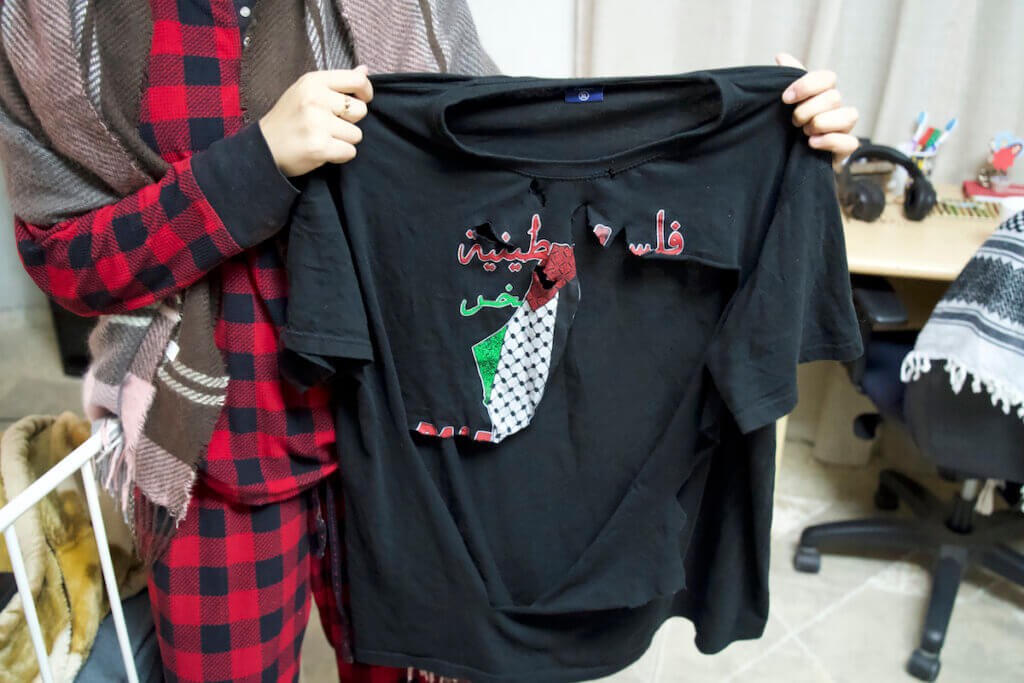
The raid lasted about 15 minutes before the soldiers left with Munther, not allowing him to take a jacket or any of his medication with him.
“We fear that such conditions, which include dire medical neglect, will endanger the health and well-being of Munther, who requires daily medication for high blood pressure and vascular issues. Denial of adequate medical treatment, common in Israeli jails, poses a significant threat to Munther’s life,” his family and legal team emphasized in a joint statement.
‘Don’t be scared, I love you’
Out on the street, the military forced Munther, a highly respected leader of the community, to sit on his tender knees, blindfolded and tied up in the cold as they raided and terrorized other homes in the camp; they made no further arrests.
Munther sat in full view of the crowded neighborhood, a deliberate decision made by the army, which often takes pleasure in asserting its dominance through humiliation tactics.
“The soldiers weren’t patient when they told him to sit down,” which is difficult for him to do with his injuries, said his sister Seham, emphasizing that they kept targeting them.
“They got mad and beat him down to the floor, hitting his legs with the butt of their guns,” she continued, “It was like the soldiers knew he had issues with his legs.”
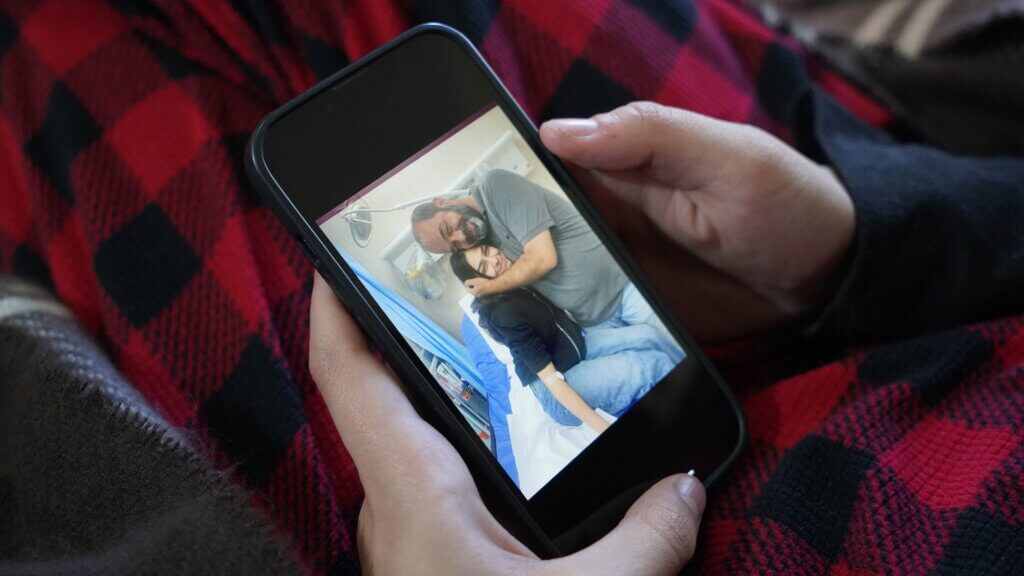
Yumna had tried to run after her father, but the soldiers turned their guns on her, and her mother pulled her back inside. At that moment, they saw Kareem sprawled out on the couch, unconscious.
According to Seham, “Sanaa’ saw Kareem with half his body on the couch and half falling on the floor, and there was no color on his face, he was yellow- so she screamed for her sons to come and help her pull him up.”
To which her oldest son replied: “Come cut these [zipties]! Let us go!”
Amid the chaos, Yumna untied her brothers while her mother, a nurse, assessed Kareem’s condition and found that his blood pressure was fluctuating intensely as he dropped in and out of consciousness.
She called an ambulance, which arrived quickly.
However, the Israeli army, who were still in the camp, denied it from entering, leaving the family to care for Kareem on their own.
It was over an hour until the soldiers finally withdrew, and they were able to get him to the hospital.
“Maybe in some houses, there is no one who knows first aid- what if someone’s head is injured by the soldiers don’t let the ambulance in?” wondered Seham out loud in exasperation.
Around 4:30 a.m., the soldiers withdrew from the camp, taking Munther with them. Yumna stuck her head out of her window to catch a last glimpse of him.
“I told him I loved him, and he said, don’t be scared, and told me he loved me. His voice sounded okay, which made me feel better.”
Seconds later, she heard a gunshot and thought the soldiers shot her, but instead, they shot at the house of the 14-year-old boy next door, one of the many children in the camp touched by Munther’s work, after he yelled out the window for him to stay safe in prison.
That was the last the family saw of Munther.
Two days later, Israel has still not allowed them to contact him, and his fate inside Israel’s unjust military court system is unknown.
Free Munther Amira
Munther’s family and their legal team are working to free him with the help of people from across the globe who are passionate about his release so that he can return home to his family and continue his humanitarian work.
“Munther is a renowned activist, and Israel is grasping at the opportunity to remove him from the stage. We are worried that like so many others in recent months, he will be put under so-called administrative detention, meaning he will be thrown in prison indefinitely without charge or trial. Israel, plain and simple, is taking hostages and using practices of arbitrary detention to target Palestinian civil society,” said Jonathan Pollak in a statement from Munther’s legal team.
Munther has about six more days before Israel has to bring him before a judge who will decide whether or not he will be placed in administrative detention, making this week highly crucial to their campaign.
Meanwhile, Pollak says they are working to arrange a doctor’s visit to Munther, noting that it would not be easy.
“Visits by lawyers, family, and the international Red Cross have been severely restricted, further exacerbating an already dangerous situation for Palestinian prisoners and detainees.”
Please sign this petition to help free Munther Amira.
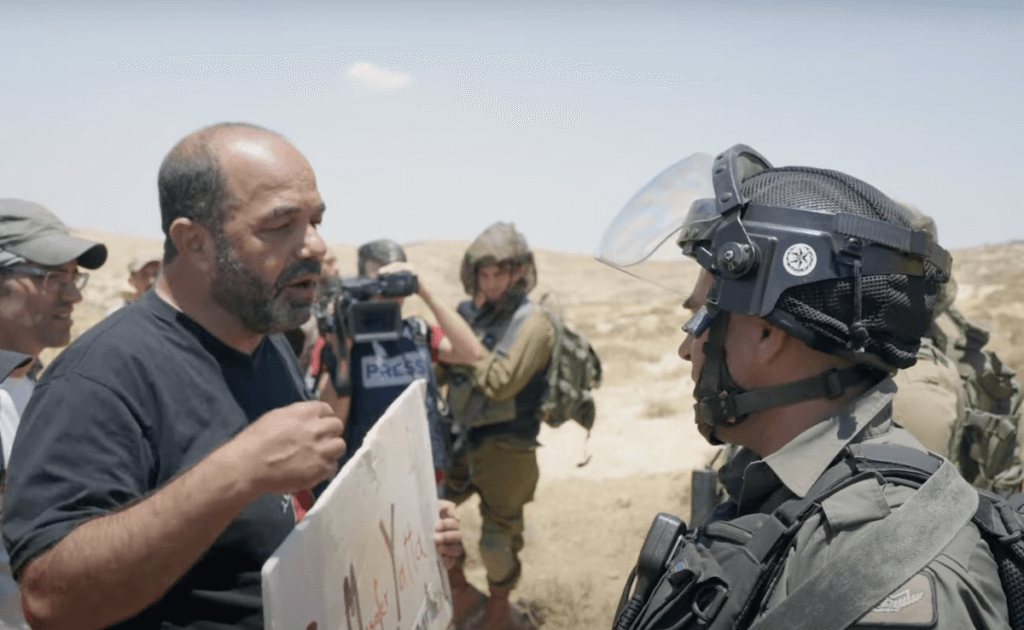
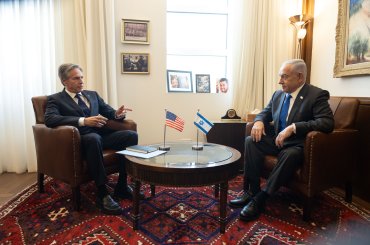
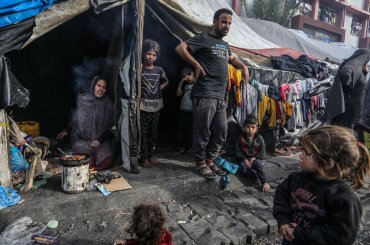
Horrifying. It put me in mind of two things. First, the description given to me over 50 years ago by a Catholic priest who had witnessed an IDF soldier beating up a hapless Palestinian at the Allenby Bridge shortly after the Six-day War: “When a trained soldier beats you up, you stay beaten up.” Secondly, the harrowing scene in Tom Stoppard’s play Leopoldstadt where the Nazi “Civilian” arrives in the Merz household and terrorises the family.
War on Gaza: We must reject this censorship of grief
By Francesca Vawdrey
“It is a cold, December evening in Cambridge, England. I have sat down at my desk in an attempt to make sense of something. I write within the atmosphere of overwhelming personal and collective grief that I have witnessed and experienced since the recent attack on Gaza.
Relatives mourn during the funeral of Al Jazeera cameraman Samer Abu Daqa, who was left to bleed for five hours by Israeli forces preventing any ambulances from reaching him, in Khan Younis on 16 December 2023 (AFP)”
https://informationclearinghouse.blog/2023/12/19/war-on-gaza-we-must-reject-this-censorship-of-grief/
He was treated this way not in spite of his nonviolence, but because of it. Israel hates nonviolence.
Caitlin Johnstone: Gaza Atrocities Are ‘Western Values’
December 21, 2023
What we see in Gaza is a much better representation of what Western civilization is really about than all the gibberish about freedom and democracy we learned in school.
“When Israeli President Isaac Herzog described the assault on Gaza as a war “to save Western civilization, to save the values of Western civilization,” he wasn’t really lying. He was telling the truth — just maybe not quite in the way that he meant it.The demolition of Gaza is indeed being perpetrated in defense of Western values, and is itself a perfect embodiment of Western values. Not the Western values they teach you about in school, but the hidden ones they don’t want you to look at. Not the attractive packaging with the advertising slogans on the label, but the product that’s actually inside the box.
For centuries Western civilization has depended heavily on war, genocide, theft, colonialism and imperialism, which it has justified using narratives premised on religion, racism and ethnic supremacy — all of which we are seeing play out in the incineration of Gaza today.”
“That mountain of child corpses is a much better representation of Western culture than anything Mozart, da Vinci or Shakespeare ever produced.”
This is Western civilization. This is what it looks like.”
https://consortiumnews.com/2023/12/21/caitlin-johnstone-gaza-atrocities-are-western-values/